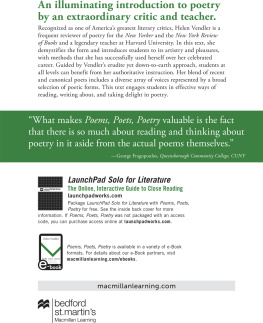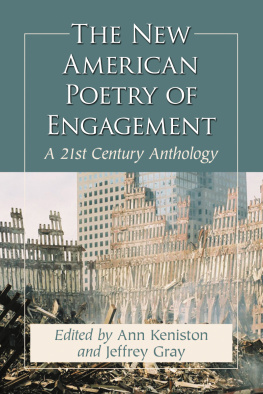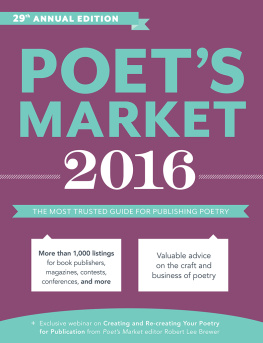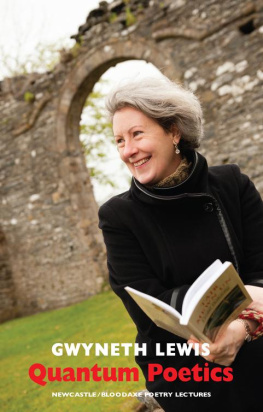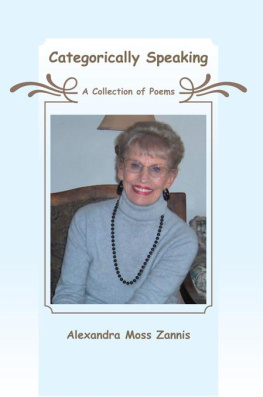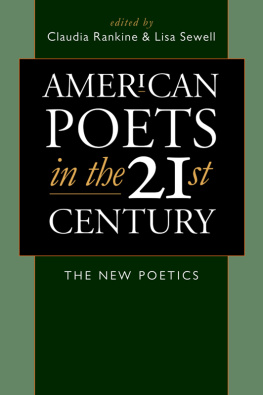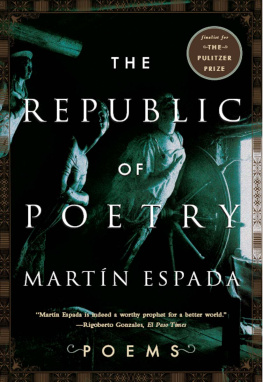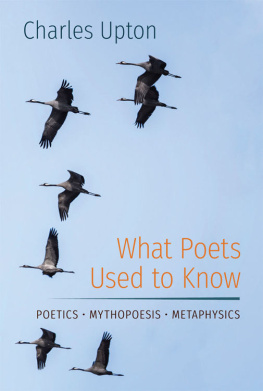Beauty is a Verb

Beauty is a Verb : The New Poetry of Disability
Copyright 2011 by Jennifer Bartlett, Sheila Black and Michael Northen.
All rights reserved. No part of this book may be used or reproduced in any manner whatsoever without written permission except in case of brief quotations for reviews. For information, write Cinco Puntos Press, 701 Texas, El Paso, TX 79901 or call at (915) 838-1625.
Printed in the United States.
First Edition
10 9 8 7 6 5 4 3 2 1
Library of Congress Cataloging-in-Publication Data
Beauty is a verb : the new poetry of disability / edited by Jennifer Bartlett, Sheila Black, and Michael Northen. -- 1st ed.
p. cm.
Summary: Beauty is a Verb is the first of its kind: a high-quality anthology of poetry by American poets with physical disabilities. Poems and essays alike consider how poetry, coupled with the experience of disability, speaks to the poetics of each poet included. The collection explores first the precursors whose poems had a complex (and sometimes absent) relationship with disability, such as Vassar Miller, Larry Eigner and Josephine Miles. It continues with poets who have generated the Crip Poetics Movement, such as Petra Kuppers, Kenny Fries and Jim Ferris. Finally, the collection explores the work of poets who dont necessarily subscribe to the identity of crip-poetics and have never before been published in this exact context. These poets include Bernadette Mayer, Rusty Morrison, Cynthia Hogue and C. S. Giscombe. The book crosses poetry movementsfrom narrative to language poetryand speaks to and about a number of disabilities including cerebral palsy, deafness, blindness, multiple sclerosis and aphasia due to stroke, among others. Provided by publisher.
ISBN 978-1-935955-05-4 (pbk.)
1. People with disabilities, Writings of, American. 2. American poetry21st century. 3. American poetry20th century. 4. People with disabilitiesPoetry. I. Bartlett, Jennifer, 1969- II. Black, Sheila (Sheila Fiona) III. Northen, Michael, 1946- IV. Title.
PS591.D57B43 2011
811.60809207dc23
2011022269
Special thanks to Sue Austin, whose Portal, 2008 graces the cover of Beauty is a Verb. Sue is currently working on a performance piece titled Testing the Water that will premier during the 2012 Olympic and Paralympic Games in London. Learn more about her work at http://www.trishwheatley.co.uk/suehome.html.
Book and cover design by the inimitable JB Bryan of La Alameda Press.
THIS BOOK IS DEDICATED TO
TOM ANDREWS, LARRY EIGNER, ROBERT FAGAN,
LAURA HERSHEY, JOSEPHINE MILES AND VASSAR MILLER,
WITHOUT WHOSE WORK THIS BOOK WOULD NOT BE POSSIBLE.
Jennifer Bartlett, Sheila Black and Michael Northen would like to thank our contributors. We would also like to thank Lee, Bobby and John Byrd, publishers extraordinaire for their belief in this project, and also Jessica Powers and everyone else at Cinco Puntos.
Jennifer Bartlett would like to thank for their direct help with suggestions, editing, daily feedback and/or childcare: Sheila Black, Michael Northen, Peter Littlefield, Morgan Ritter, David Weinberg, Nancy Wendel, Anne Foltz, Ava Capote, Michael Foley, Marie Stewart, John Stewart, James Yeary and Lisa Jarnot. In addition, for their constant support: Janet Rodney, Julia Hecomovich, Jeff Hoover, Sam Lohmann, Tara OConnor, Rachel Peskin, Thomas Mitchell, Eric Chappelle, Barbara Beck, Deanna Ortiz, Anne Beyer, Tom Beyer, Maryrose Larkin, Royal Alvis, Brigit Nagel, Charles Bernstein, Susan Bee, Norma Cole, Ron Silliman and Edwin Torres. And the people without whom poetry would not be possible: Jim Stewart, Lee Bartlett, Emma Bartlett, Roxann Beck-Foley, Nathaniel Tarn, Andrea Baker, and as forever, Jeffrey.
Sheila Black wishes to thank her husband Duncan Hayse for his stellar proofreading skills and keen brain. Co-editors, Jen and Mike, without whom this project would have remained the ghost of an idea; dear friends: Karen Bucher, Cathy Carver, Michelle Granger, Melissa Kwasny, Michele Marcoux, Candice Morrow, Marnie Nixon, Bernadette Smyth, Megan Snedden, Stephanie Taylor, Carrie Tafoya, Michele Valverde and Connie Voisine for their unfailing good advice and support. Her children Annabelle, Eliza and Walker Hayse, who have helped me in every way they possibly could. Her parents Clay and Moira Black, and amazing sisters Samantha and Sarah, and last but not least, Lenore Parker, for all her wise counsel over many years, and the late Robert Fagan, for being such a wonderful poetic mentor.
Michael Northen is grateful for the support of his wife Lora and children Patrick, Maura, Melissa, Maya and Elijah. Special thanks to the Inglis House Poetry Workshop, especially Stuart Sanderson, Dana Hirsch, Yvette Green, Steve Parker and Denise March, without whom there would have been nothing to contribute to this book. He thanks his mother Elvera Northen and his brother Ed, for his continued belief in poetry. Finally, thanks to co-editors Sheila Black and Jennifer Bartlett for all their hard work, and to Jim Ferris for his encouragement and support.
CONTENTS
Publishers Note: Cinco Puntos is pleased to offer this anthology as an e-book. E-book technology makes the book accessible to many more people than the print book alone. Many e-book readers reflow text, altering its structure. For prose, this isnt a problem but it can dramatically alter the way a poem reads. We encourage readers to refer, where possible, to the print book to see
each poets exact intent with their poems
Jennifer Bartlett
PREFACE
(for Reginald Shepard)
F or me, the idea for Beauty is a Verb can be pinpointed to one single moment, December 10, 2005, the day Norma Cole read at the Bowery Poetry Club for the Segue Reading Series. A few years earlier, after a stroke, Cole lost and regained her ability to speak. Now, she used her temporary aphasia and slurred speech to compose a poem that noted a list of words she could no longer enunciate. The result of her reading this work was alternately hilarious and devastating. Cole laughed at the ridiculous, yet utterly wrenching, situation of a poet losing words, and the audience laughed with her. Yet, it wasnt as simple as that. Although the audience laughed, they were also visibly uncomfortable. From the sophistication of Coles work and her genius as a person, one can guess that this was no accident. Can an entire anthology be sparked by one reading of one poet? I am sure crazier things have happened in this world we called poetry.
After, I began to consider a series of questions. What did it mean to have a disability poetics? What was the history of the movement? What about poets, much like myself, who have a disability, but do not align themselves with identity poetry or the disability poetics movement? How do they fit into such a context, if at all? Shortly after, I was invited by Sheila Black and Michael Northen to participate in a panel exploring many of these ideas at the 2009 Associated Writing Programs Conference in Denver. Over cocktails, the idea of our anthology, this anthology, was born.
While Beauty is a Verb includes many views of disability, we hope to consistently consider the social model of disability. It is for this reason that we primarily chose poets who have a visible disability. In this the poets difficulty becomes twofold: a struggle with physical limitations (which, in themselves, can be a construction) coupled with societys critique of the non-normative body. We mean to explore not only what is means to have a genre called Disability Poetics, but to look at poetry influenced by an alternate body and how this intersection forms a third language. Hence, we include not only poets who created and embrace the disability/crip poetics movement but also those who might resist such a classification and have never been considered in that exact context.


